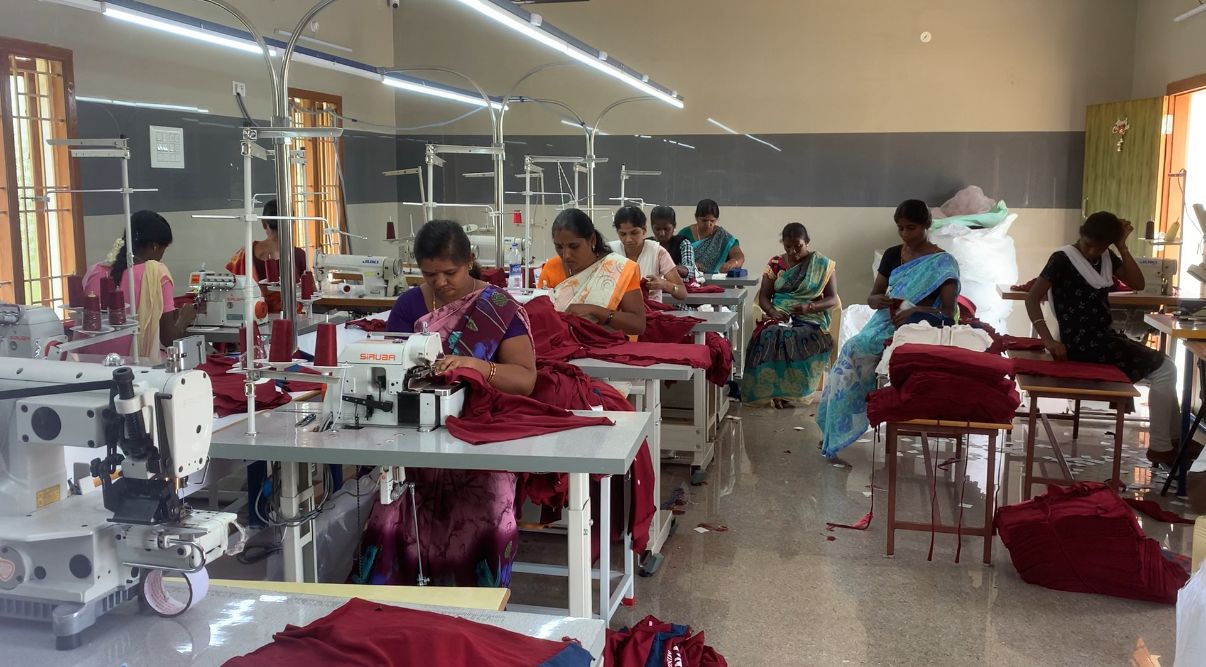It is difficult for people in the west to realise just how poor and marginalised our rural villagers are. The team works especially with Dalit families, what was at one time termed ‘untouchables’, and the women within these villages are particularly at risk of abuse and unemployment. When in work they earn only a pittance and if work is not available their families go hungry. We therefore concentrate on offering training and employment so that these women can lift themselves out of poverty and transform the lives of their families. We do this in a number of ways. Scroll down to see.
Tailoring Training:
Trainees are recruited for the six months course offered by expert seamstresses. On completion they are awarded a certificate – which is now recognised as proof of ability by local employers. Once trained most are then provided with interest free loans to purchase sewing machines.
The training is offered in three centres, one of which trains women from the extremely disadvantaged charcoal burning community. 110 women are trained each year and to date well over 1,000 women have been trained.


Women graduating from our tailoring programmes can choose to receive a sewing machine which they repay the cost of over two years. This enables them to leave their previous precarious employment in favour of self-sustaining independent income. On average, this enables women to triple their income, providing a stable financial basis for them and their families, so that their children can remain in education. Some women gain employment in a local factory and therefore do not want or need their own machine at home. Once loans are repaid, they are gifted to new graduates, buying more sewing machines for more women.
Since 2012, we have supported 60% of our graduates (400 women) to set up as skilled independent tailors in their own homes. The remaining graduates gained employment in local factories.
Selvi aged 31 graduated in October 2019. Before training as a seamstress she was unable to put food on the table for her children as her husband is a seasonal worker and an alcoholic. She said –
“It’s been ten days since I received my own sewing machine. I have completed 12 orders and earn’t enough money to eat meals three times a day with my family as well as saving for the sewing machine loan repayments. I thank you for releasing me from my poverty.”

The Tailoring Co-operative:
Because the women gather together for the training, this gives them opportunity to share ideas and concerns – empowering these women for the first time. Of their own initiative eleven such women have created their own sewing cooperative! With our help, they have invested in modern garment-making machines, so that they are now earning £10 per day instead of their usual £1.50 per day! This successful pilot project will now be repeated with new co-ops of a similar nature.


Handloom Weaving
Highly skilled weavers from the Swarastra community have migrated to the area we work in from Gujarat. Often trapped in poor conditions and low wages within factories, access to our Revolving Funds enables Swarastra weavers to re-start their traditional skills and economic model as independent crafts-people.
With these looms the women produce beautiful hand-woven silk sari fabrics, sold direct to local shops.
We have run this project successfully since 2012. In this time we have supported 111 weavers and and the Revolving Funds continue to be made available to new families.
